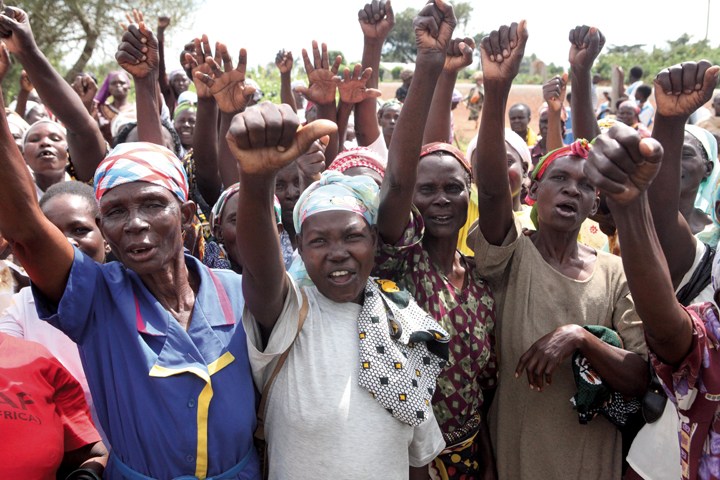All around them are graves. Thulisile Dladla of Swaziland buried her husband and three of her children. Immaculate Nakyanzi of Uganda lost her parents, most of her brothers and sisters, her husband and two of her children. Zodwa Hilda Ndlovu of South Africa first lost a daughter, then her HIV-positive son doused himself in gasoline and burned himself.

AIDS has killed 25 million people in sub-Saharan Africa, and left more than 15 million orphans with no one to care for them. No one except the grandmothers. They’ve become a continent’s caregivers by default: inheriting a generation of boys and girls who need to be fed, clothed, schooled and loved through the trauma of losing their parents in the pandemic.
It is an impossible job, made even crueler by the fact that many of the grandmothers are themselves HIV-positive, who are, themselves, grieving. Impossible, but also impossible to avoid.
“At my age,” said Thulisile, “you don’t have much energy to take care of people, but now I have to find the energy, because if I don’t cook for these children, no one will … The people in our families who used to support us are all gone.”
But feeding a generation is only one of the challenges they face. African women, especially older ones, are in many ways an underclass: poor, powerless, and the target of discrimination when it comes to property laws, inheritance and the justice system. In Swaziland—one of the worst-hit by AIDS—caregivers like Thulisile only get money from the state when they turn 60. She’s in her 50s, and that’s turned her into a lobbyist for fairness.
“It is an election year, and we grandmothers are talking to our MPs, letting them know that if they want our votes, they must change the law.”
The grandmothers, exhausted by the burdens they carry, have been forced to learn leadership. One of their teachers is Uganda’s Mariam Mulindwa. She has 17 people in her home–her own children, grandchildren and a group of orphans.
Yet somehow, she found the time to sit on the local Land Rights Committee, and help other grandmothers who were being afflicted by land-grabbers—family members who tried to steal the home and property from women parted from their husbands by death or divorce. “It makes a huge difference to have a grandmother on this committee,” she said.
Mariam reminds the grandmothers of their rights, and how they can better protect the children who live under their roof. “I even learned how to convince them to make out wills and I feel very good about this…It is important because it means their children will be safe to inherit.”
The women know it is a race against the calendar. Who will care for the children when they themselves die?
It’s that sense of urgency that has propelled both the Stephen Lewis Foundation and thousands of Canadian grandmothers to lend their voices to the fight for equality. For their part, the Canadian grandmothers have raised $21 million for the cause, while the Foundation has issued a call to action, and given the African grandmothers a platform from which to make their appeal to the world.
WATCH BELOW: Jo-Anne Page is one of thousands of Canadian grandmothers giving moral support, and money, to their beleaguered counterparts in sub-Saharan Africa – the women raising a generation of children whose parents died in the AIDS pandemic.
“We understand that this is not an exercise in charity or benevolence,” said Ilana Landsberg-Lewis, executive director and co-founder of the Foundation. “The threshold of tolerance for injustice must be shattered today, and the resources and support you require to effect change in the face of AIDS … must be acted upon.”
The work of the Foundation and the Canadian grandmothers can be seen in a documentary entitled African Grandmothers Tribunal: Seeking justice at the frontlines of the AIDS crisis, which premieres in Toronto at the Bloor Hot Docs Cinema on Thursday, November 27.
16×9’s “In Grandma’s Care” airs this Saturday at 7pm.





Comments